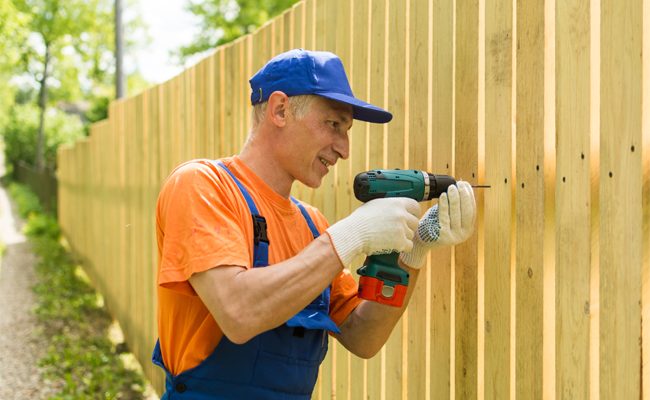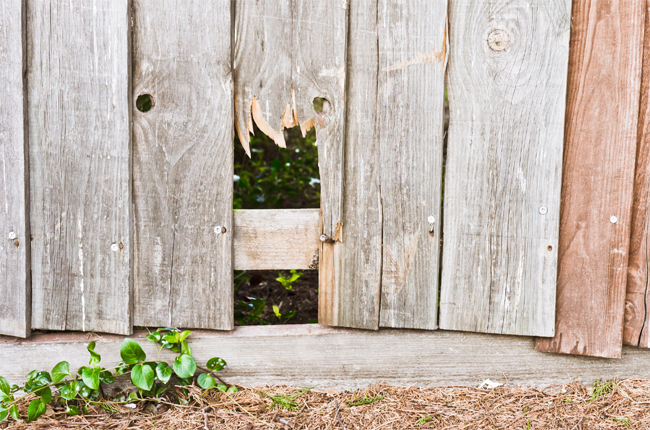
Whether wooden, concrete, metal, chain link, composite, or vinyl, a fence is more than just a visible landmark between your property and neighbors. It can also provide a comfortable and pleasant space for outdoor activities. More importantly, it enhances your home’s privacy and curbs appeal.
However, fences can deteriorate over time due to wear and tear or aging. In such cases, you may wonder when’s the best time to replace yours. Frequently, the answer isn’t clear enough because it depends on the quality, installation, and the fence’s material. Sometimes, you might even think that a simple repair can bring back its glory, only to realize later that numerous sessions would be needed. The expenses may replicate or even exceed that of an entire replacement, costing you more time and money.
Luckily,
Below is a guide on how often you should replace your fence.
Wood Fences
Most homeowners prefer installing wood fences because of their affordability, wide range of colors, easy installation, and more. Typically, they last between 5 to 30 years, depending on the type and quality of wood, maintenance, and installation process.
However, one of the disadvantages of wood fences is that they’re vulnerable to rot, especially in rainy seasons. Moisture primarily contributes to their decay. This is characterized by wood that feels soft to the touch, and affected panels may look darker than the others. You may also notice a musty smell due to mold growth.
So, to prolong the lifespan of your wooden fence, it’s advisable to seal the wood yearly to protect it from rotting. Moreover, rotting weakens your fence, threatening your safety and security. So, replacement by a reputable service provider such as BuzzFence – Fort Worth Fence Company would be ideal. Most repairs are short-term solutions, making the rot spread quickly to other unaffected wood panels.
Aluminum Fences
Most people prefer aluminum fences because of their longevity (they usually last from three decades to half a century, as long as they’re well-constructed), affordability, durability, low maintenance, appearance, and security features.
Even though they’re not prone to splitting, rusting, rotting, or warping like other fence types, you’ll need to clean them periodically, usually to remove algae to ensure the finishing remains intact and continues to protect the material.
The most common damage to find is corrosion and dent. If struck with something like a tree, replacing the place that has bent out of shape or in most parts of the fence have been affected by corrosion might be possible.
Wrought Iron Fences
Most residential properties prefer wrought iron fences regardless of their cost. They’re revered for their ease of maintenance, longevity, design flexibility, and durability. However, some signs require replacements immediately. These include rusting, bent, or detached parts, or if the fence itself isn’t closing correctly.
Wrought iron fences are expected to last a lifetime if maintained properly. Also, you should regularly check for oxidation, indentations, and scratch marks to prevent rusting. Oxidation might weaken the metal leading to difficulties in moveable parts, like joints and hinges. Thus, replacement may be necessary in such cases.
Vinyl Fences
Vinyl fences are also becoming popular due to their unbelievable lifespan. They’re made with polyvinyl chloride (PVC) that helps boost their durability even without rigid maintenance. Also, some manufacturers use titanium dioxide coating to enhance these fences’ quality and protect them from fading. In addition, they’re easy to install, require low maintenance, come in a variety of designs, and are often more affordable than other fence types.
Vinyl fences are crack, insect, rot, and fade-resistant, lasting 25-30 years. However, conducting a regular inspection for any signs of damage is crucial. Have a professional help you with the checks because most of these manifestations are hard to miss. If you fail to spot them early on, they can cause more damage in the future.
Always ensure to oil the hinges and examine the screws. If there are loose ones, tighten or replace them. Doing this prevents the fence from swinging during harsh weather conditions.
Chain Link Fences
A chain link fence is an affordable way to protect your property. However, you should expect it to last 10-15 years before replacement. Chain link fences require low maintenance but can rust easily due to exposure to weather conditions.
Inspecting it regularly for obvious damages like missing nails, rust, fraying, the gate doesn’t work, broken posts, and holes necessitating fence replacement is necessary. The fence’s aesthetic and security features will be compromised if there are too many holes or existing rust.
Composite Fences

Most homeowners prefer composite fences because of their durability and resistance to harsh weather elements, rust, rotting, insect infestation, mold, moisture damage, and more. They can last 30-50 years if maintained properly.
However, composite fencing needs more care than natural timber to make it perform well and look good. But if you neglect it for many years, it might be necessary to replace it. Also, if your fence is leaning over, it’s a sign to replace it. Not every time it becomes unstable, you pull them back up. It becomes frustrating if done repeatedly. Often, leaning fences indicate a problem with the structural support, which can cause the entire fence to topple over. If yours is leaning over, it’s a sign that it’s no longer stable.
Conclusion
When adequately maintained, a fence can last a long time without replacements. However, some factors can affect its longevity, regardless of materials, weakening its structure. These include missing or broken boards, rot, corrosion, harsh weather conditions, falling trees, and even accidents.
That said, it’s a must to conduct regular checks to spot signs of damage early on, preferably with the help of expert hands and eyes. These assessments would help you determine whether or not it’s time to replace your fence. This way, you’ll avoid shelling out for numerous repair works that only offer temporary solutions, costing you more in the long run. Also, ensure that the company you’ll hire has the right skills and knowledge to provide high-quality output and obtain value for money.
Leave a Reply